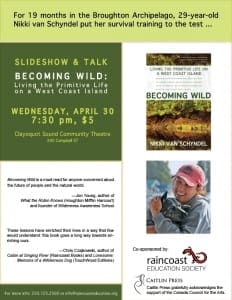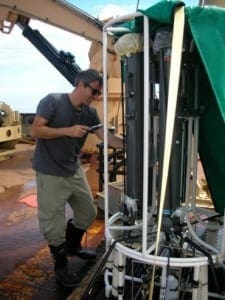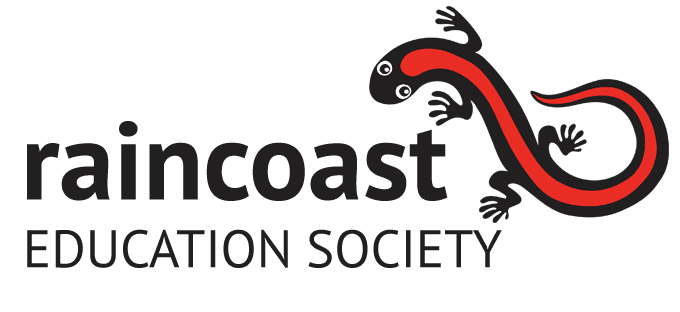2013 Raincoast Speaker Series

Nikki Van Schyndel
Nikki van Schyndel is not your typical grizzled survivalist. She is a contemporary young woman who threw off modern comforts to spend nineteen months in a remote Broughton Archipelago rainforest with her housecat and a virtual stranger. A lively and experienced speaker, Nikki will share stories of her experience, how she relied on her knowledge of BC’s coastal flora and fauna, and the ancient techniques of hunting and gathering to survive. Nikki also complements her talk with a slideshow presentation and examples of some of the things she has made; from cedar bark clothing to fish hooks.
Nikki van Schyndel studied with and taught under some of North America’s leading survivalists, trackers, and primitive artisans, and graduated from the Dominion Herbal College in British Columbia. Check out her new book Becoming Wild here: http://caitlin-press.com/our-books/becoming-wild/

Dr. Jay Cullen
The mega-thrust earthquake of March 11, 2011 off the coast of Japan and subsequent tsunami led to globally significant releases of radioactive elements from the Fukushima Dai-ichi Nuclear Power Plant. The atmospheric fallout and direct discharges of radionuclides to the ocean in particular were unprecedented. Radioactive elements from Fukushima arrived on the west coast of North America in the air about 4-5 days after the disaster while the ocean plume of radioactivity was first detectable in seawater along the Canadian west coast in summer 2013. In this presentation, the radioactive releases, transport from Fukushima and expected maximum concentrations on the west coast of North America are discussed in light of naturally occurring radioactivity and historic releases of radioactive elements from human activities. Ongoing monitoring efforts and likely impacts on environmental and public health are also discussed.
Dr. Jay T. Cullen grew up in the Kawartha Lakes area of central Ontario in Peterborough and developed an interest in lakes and oceans early on. He took his BSc (Honours) in Biology from McGill University and PhD in Chemical Oceanography from Rutgers University. After a postdoctoral scholarship at Woods Hole Oceanographic Institution in Massachusetts he has been at the University of Victoria in BC, Canada since 2003 where he is an Associate Professor in the School of Earth and Ocean Sciences. He has helped to develop sensitive analytical techniques to measure metals and contaminants in natural waters. Through a combination of analytical chemistry, radioisotope tracer studies and collaboration with microbial physiologists his research program aims to understand the distribution, chemical speciation and fate of metals in the ocean and the influence of human activities on the health of marine ecosystems. See the Cullen Lab websitehttp://web.uvic.ca/~jcullen/ for more information. Twitter @JayTCullen

Dr. Enid Elliot
This presentation will share the work done to develop and implement Canada’s first Nature Kindergarten at Sangster Elementary School in the Sooke School District. In this kindergarden program, children spend all morning (every morning, whatever the weather) outside experiencing a growing sense of wonder, improved health and fitness, mental and emotional development, awareness of the environment, and an appreciation and understanding of traditional ways of knowing with Nature as co-teacher.
Enid Elliot, PhD, is an early childhood educator who has been continually surprised, intrigued and delighted by the children, families and early childhood educators with whom she has worked, played and loved. Having experienced the influence of natural settings on young children over the years she was involved in creating the Nature Kindergarten in the Sooke School District, which opened in September 2012. This past year she spent one day a week learning and listening with the children and educators outside. She is currently on faculty at Camosun College and is adjunct at University of Victoria.

Dr. Craig Stephen
In his presentation, Craig will discuss the need to re-imagine how we think about healthy salmon populations and why, at a time of unprecedented environmental change, it is time for collaboration rather than conflict if we aim to conserve this iconic species. Salmon health has too long been focused on finding the ‘smoking gun’ that will explain why some runs are declining. Craig will discuss why a ‘health-first’ agenda might be a more effective approach to salmon recovery in our changing world.
Dr. Craig Stephen is the director of the Centre for Coastal Health in Nanaimo. The Centre is a non-profit organization that looks at health issues at the interface of people, animals and their shared environment. Craig is a veterinarian with a PhD in epidemiology. He has worked extensively in Canada and around the world looking at how we can prevent environmental risks and promote healthy populations by applying collaborative approaches that cross species and disciplines. His work has involved several fish and wildlife projects including work on salmon health in BC such as being a scientific advisor to the Cohen Commission into the Disappearance of Fraser River Sockeye Salmon and being a health advisor to the World Wildlife Fund’s Salmon Aquaculture Dialogue. Craig was the fish health veterinarian for over 10 years for the Vancouver Aquarium and now provides health advice to the Ucluelet Aquarium. Craig is a professor in the Department of Ecosystem and Public Health in the Faculty of Veterinary Medicine and in the Department of Community Health Science in the Department of Medicine at the University of Calgary.

Markus Pukonen
Markus will share stories, photos, and video from his recent attempt to row across the Atlantic Ocean 5800km from Dakar, Senegal to Miami, USA. As a member of the Canadian Wildlife Federation Africa to the Americas Expedition, Markus joined forces with the Oar Northwest team with a mission to gather oceanographic, physiologic, and physical data and use the adventure as a means of educating and inspiring children. He spent 72 days at sea before capsizing in rough seas 650km north of Puerto Rico.
@markuspukonen
oarnorthwest.com
Markus Pukonen is more of a bushwhacker than he is a trailblazer. Over the years he has worked as a Puma Trainer in the Bolivian Amazon, a Silviculturist in British Columbia, a Wildfire Suppression professional across Canada, and in recent years as an Environmental Action and Adventure Documentary Filmmaker. Among other adventures, he has biked 2500km of the Pacific coast of the U.S. and in 2010 became the first person to Standup Paddleboard across the Georgia Strait, 55 km from Vancouver to Nanaimo. Markus believes in impossible things on a regular basis and is striving to create the world he wishes to live in. Born and raised in Toronto he now surfs and plays with his nieces in Tofino.

Taina Uitto
Does the bag monster that dwells under your sink scare you? Does the idea of the Pacific Garbage Patch keep you up at night? Tired of creating so much garbage and ready to tame that unruly consumer? So many good reasons to consider reducing the amount of plastic in your life…or to go plastic free!
Going on her fourth year of living plastic-free, Taina has plenty of stories that will educate, inspire, and entertain. Taina has a Masters Degree in environmental conservation, and is the author of the popular blog Plastic Manners, as well as the Director-Producer of the upcoming film From the Waste Up. As one of the few existing speakers on the topic worldwide, her story has been featured in Canadian and international media.

Dr Briony Penn
Clayoquot Sound has attracted and influenced many of the leading western naturalists/scientists/environmentalists over the past 100 years, e.g., early naturalist/anthropologist Charles Newcombe, conservation biologist Annie Alexander, Ian McTaggart Cowan and Charles Guiget and the provincial museum years, marine biologist Ed Ricketts and Cannery Row, the Clayoquot Sound scientific panel and integration of traditional ecological knowledge, indigenous leadership on quantifying ecosystem services, the ever present scientist/artists, scientist/writers. Through 30 years of journalism, activism, working as a naturalist and a biographer of Ian McTaggart Cowan, Penn explores some of the ideas and people she has stumbled across that have built upon Clayoquot Sound’s traditional culture of conservation, whether it is by documenting biodiversity, bringing back specimens to educational museums, creating ecological reserves, critiques of forestry, portraying conservation biology in novels or art, promoting wilderness preservation, civil disobedience, advocating alternative landuses to resource extraction, from trapping to non-timber forest products to ecotourism, reforming our economic system or enchanting the disenchanted, Clayoquot Sound has seen it all. What has worked and what hasn’t, and where is the leading edge now?
Dr Briony Penn is a geographer, educator, columnist, activist, artist and historian from Salt Spring Island. For more info on Briony: http://www.thewildside.ca

Paula Wild
Please join us for Paula Wild’s presentation about her new book, The Cougar: Beautiful, Wild and Dangerous.
The west coast of Vancouver Island is a hot spot of cougar activity, and several stories from The Cougar take place in Tofino. The book is a blend of natural history, First Nations stories, and personal accounts. It shows how Canadians’ views of cougars have changed over time, through First Nations mythology, the earliest recorded accounts of cougar attacks and the fear they provoked, stories that have come from cougars kept in captivity, or else wandering unexpectedly into cities and populated areas, as well as cougar attack hot spots, and even a cougar safety checklist. There are also some amazing photos of cougars in the book that Paula will be showcasing in her presentation. One of Paula’s main points in the book is that co-existing with cougars isn’t about fear, it’s about education.
Please follow this link for more info on the book: http://www.douglas-mcintyre.com/book/the-cougar
